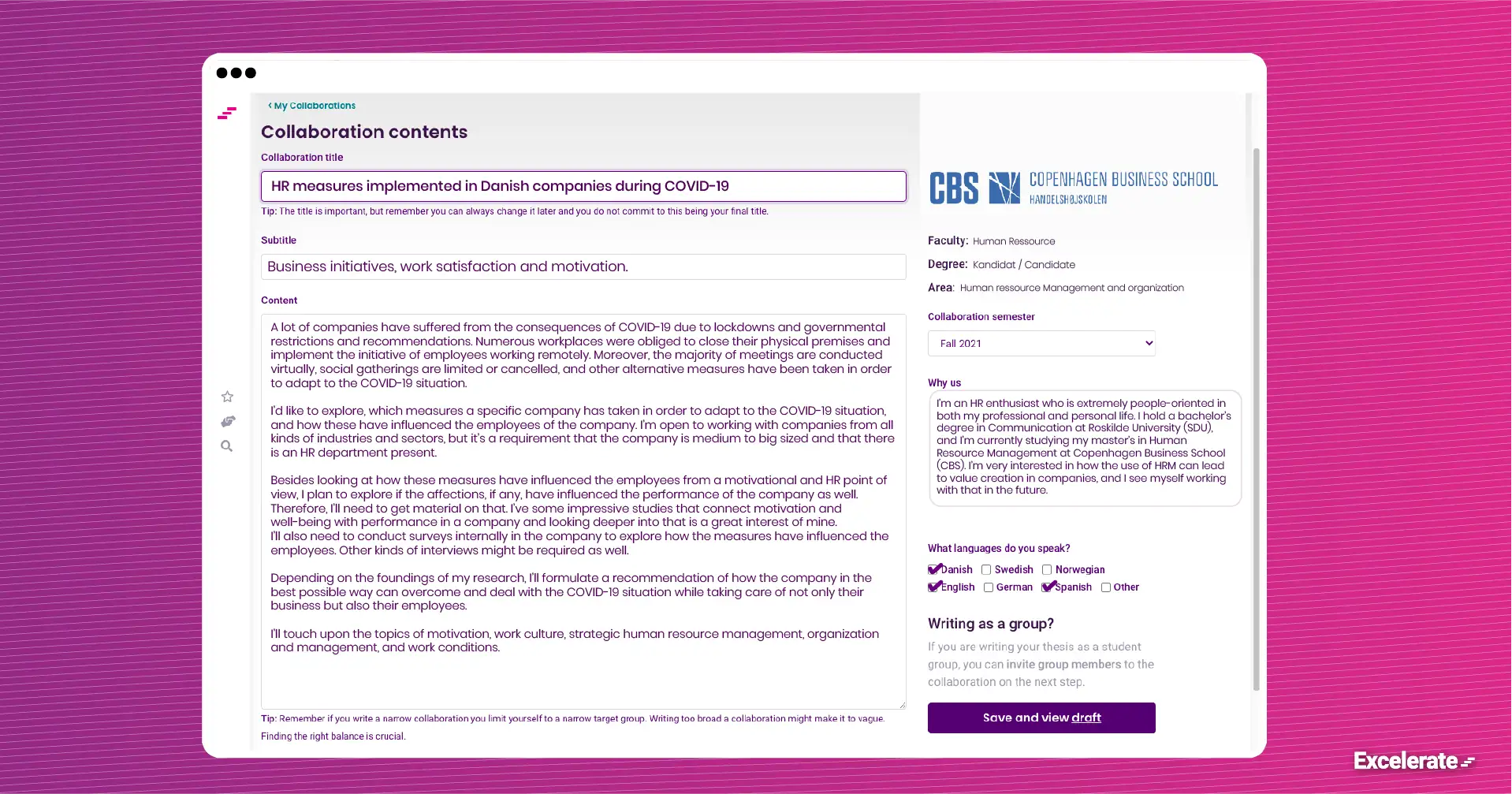How to write the perfect thesis statement for your Master’s – 6 easy steps
Tips on thesis writing
Karoline Denning
Karoline is a student at the University of Copenhagen and is a content creator at Excelerate. Among other things, she is responsible for the Excelerate blog, content activities, and onboarding of students and companies.
In order to attract the right companies for your thesis collaboration, you’ll need to lure it with a kick-ass thesis statement for your candidate. Your thesis statement needs to be engaging and informative enough. That’s obviously easier said than done, and for that very reason, we’ll guide you on how to write the perfect thesis statement for your candidate (and bachelor’s and master’s). You can also find inspiration on good topics for your Master’s and Bachelor’s thesis.
The guide will take its point of departure in a thesis topic, we have made up. Hence, you can easily transfer your own kick-ass thesis topic for your candidate into the template and ideas stated.
6 step guide to filling out your thesis statement
We have created a step-by-step guide on how to best complete your thesis statement on Excelerate, so that the companies choose your thesis to collaborate with. We will run through your thesis title, subtitle, thesis description, value, motivation and why the company should choose you.
Find a good thesis title
The title is the most critical part, as this is where you have the possibility to distinguish yourself from all the other thesis topics other students have listed. The thesis title is the first impression the company will get of you, as a student, to decide how relevant you’re for them.
Let’s say you plan to write a thesis about the effect of the measures Human Resource (HR) departments in Danish companies have implemented during COVID-19. Moreover, you’d like to include how these have affected employee satisfaction, and if this in any case is reflected in the performance of the company. If possible and necessary, you’ll suggest other types of measures that could be more efficient. In this example, you’re most likely a student enrolling at an HR program.
The above-described example is your problem area, and now you’ll have to narrow it down to one single title.
To make it, select words for your title that reflect the context of your problem area and the terminology used within that area as well.
Taking all that into consideration, a thesis title could be as follow:
HR measures implemented in Danish companies during COVID-19
How you define your problem area and thesis title depends very much on your educational background. Meaning which trends, terminology, and methods are prevalent within your area of expertise, and which industry you’re looking to write for as well. Remember to consider that when writing a thesis topic for your candidate.
Have in mind that you can/may include the following in your thesis title:
- Important terms
- Problem area
- Your goal and approach
- Theoretical perspective
Tip: Be as concise and precise as possible.
Create a detailed subtitle
After finishing your collaboration title, the next step to work on is your subtitle. You have a few different options with the subtitle, which serves the purpose of backing up your collaboration title. Moreover, the overall thesis topic of your candidate.
You can either:
- State a sentence that is not included in your collaboration title, which is a bit more generic or works as an extended version of your collaboration title.
- State a few keywords/topics, which cover what your thesis is about.
If we hold on to the problem area, which we stated above, a subtitle could go like this:
Business initiatives, work satisfaction and motivation
If you find a third option that works better for you, you can certainly go with that.
Write a thesis description
At this point, you can state a more comprehensive description of your thesis topic for your candidate and your thoughts on the project. Although there is a lot more space to fill in it’s a good idea to maintain as concise and precise as possible. Perhaps you’re not that far in your thesis process yet, and things can still change until, and when, you actually start writing your thesis. However, try your best to write down as many of your thoughts and ideas as possible for the companies to get the right impression of what you want.
Have in mind that you can/may include the following in your thesis description:
- An introductory part of how you developed your thesis topic
- Purpose of your thesis
- Your educational/professional background
- Topics related to your thesis
- Problem statement or relevant questions
- Your approach
- Theoretical considerations
- The material you require from the company
- What you can bring to the company
- Other thoughts and ideas related to your thesis
In order for you to get a proper idea of how an actual content part can look like, we’ve made one for you, which is formulated according to the problem area already described:

You can structure your thesis topic in a lot of different ways, and you do not necessarily have to follow the same structure as this one. Also, you may leave out some parts stated here and add others that are of higher relevance to your thesis topic.
Describe what value your thesis contributes
What value do you and your thesis group bring to the company? Put into words what the company gets out of a thesis collaboration with exactly you. The better you can describe the end product and its value, the better the company can understand whether it is the right thesis collaboration.
Value can look many different ways. Here are some examples:
- New insights within the industry
- Possibility to follow and discuss with the student along the way
- Competitive advantages
- Adapt the thesis to the company’s challenges
- Financial gain
- Insight into the working environment and well-being in the workplace
You’re the one who can best describe what value your specialism brings to the company.
Explain your motivation behind the thesis
Under this section, you explain why you have chosen to work with the particular topic you want to write about. There can be many reasons to why you found motivation for your thesis topic. Maybe you got a good idea one afternoon, maybe you dream of a job in the industry, or maybe the interest arose during a course at the university.
An example could look like the following:
I fell in love with the topic during my fifth semester course and I have had an internship in the same industry. This is what I want to work with in the future. It’s an industry that’s constantly evolving, which is what makes it super exciting, and I get to work with the latest research and findings, which is very motivating.
Tell the company why they should choose you
In the ‘why us’ section you’ve another opportunity to draw the attention of the companies. You can state the most crucial argument of why the company needs to choose you, the passionate student. Remember, that the description is supposed to be short and clear!
You can/may include the following in the ‘why us’ section:
- Your educational background
- Your greatest academic interest
- What is unique about you
- Thoughts about future career
- A reason why a company should choose you
When putting that into consideration a ‘why us’ section can look like this as stated in the picture above:
I’m an HR enthusiast who is extremely people-oriented in both my professional and personal life. I hold a bachelor’s degree in Communication at Roskilde University (SDU), and I’m currently studying my master’s in Human Resource Management at Copenhagen Business School (CBS). I’m very interested in how the use of HRM can lead to value creation in companies, and I see myself working with that in the future.
This section works as a good opportunity for you to give the companies an idea of who you are.
Summing Up
When you’ve filled in all the sections of your thesis topic for your candidate then go through your writing a few times. Check if you’ve included all the relevant stuff that will help companies to get an overview of what your thesis is about. Otherwise, you’re good to go. If you’re still at loss when it comes to what your thesis should be about you can check out our 8 steps to choosing your thesis topic.
When you’ve listed your kick-ass thesis topic for your candidate, you’ll just need to stay patient and wait for the companies to reach out to you. Let’s make sure passion and thesis go hand in hand. Cheers!


